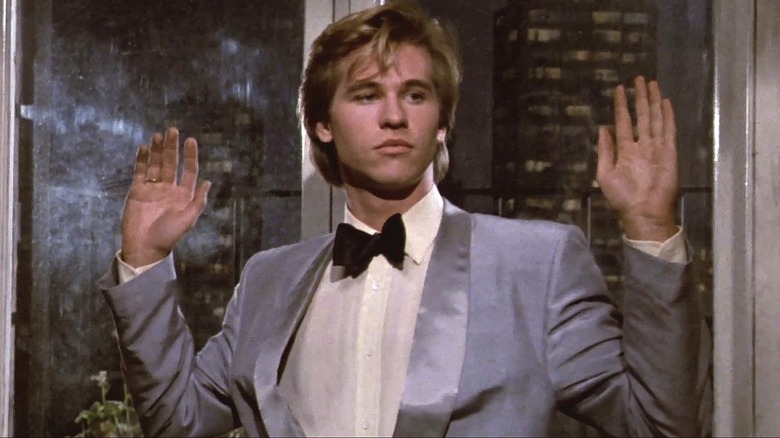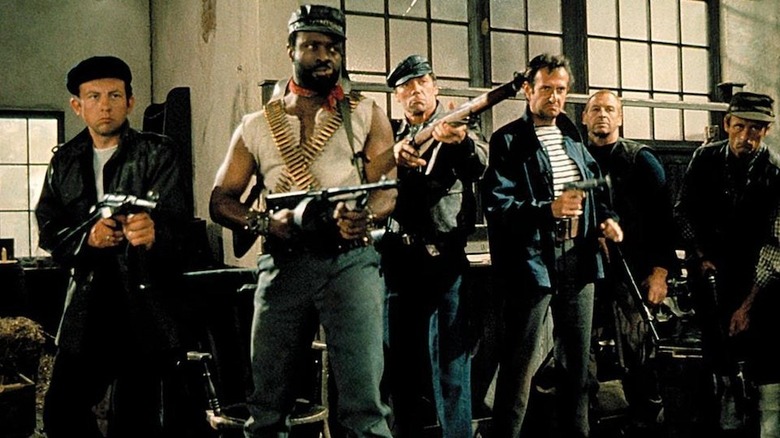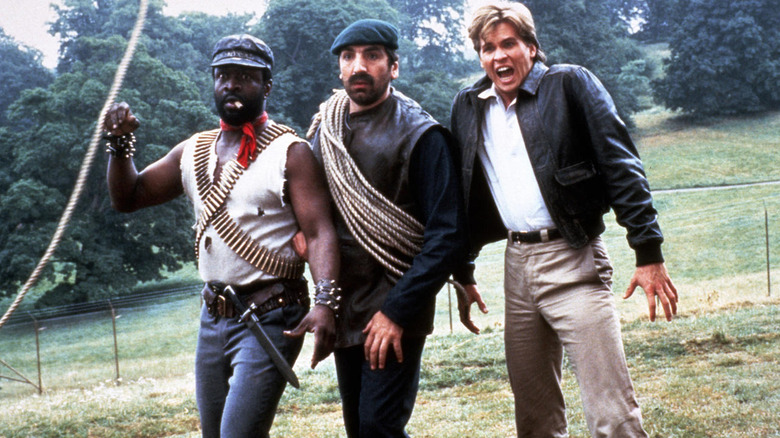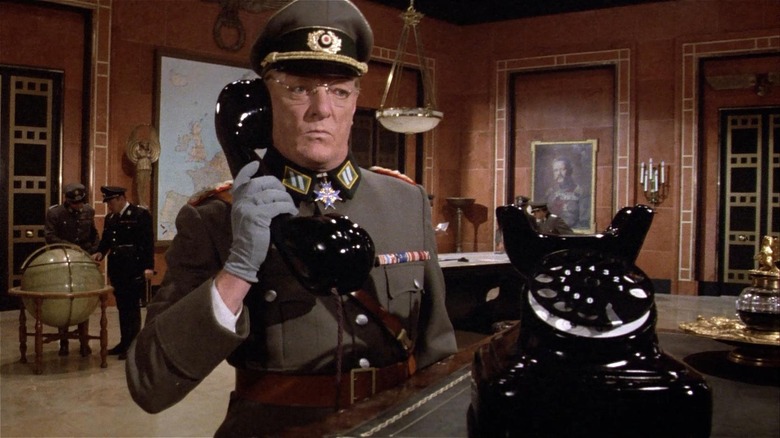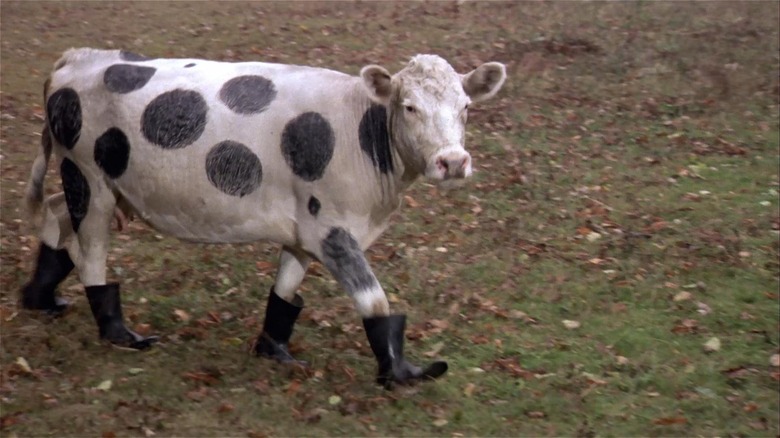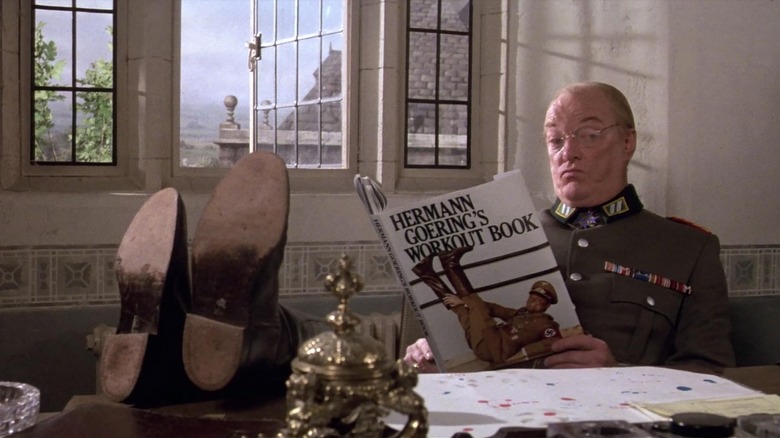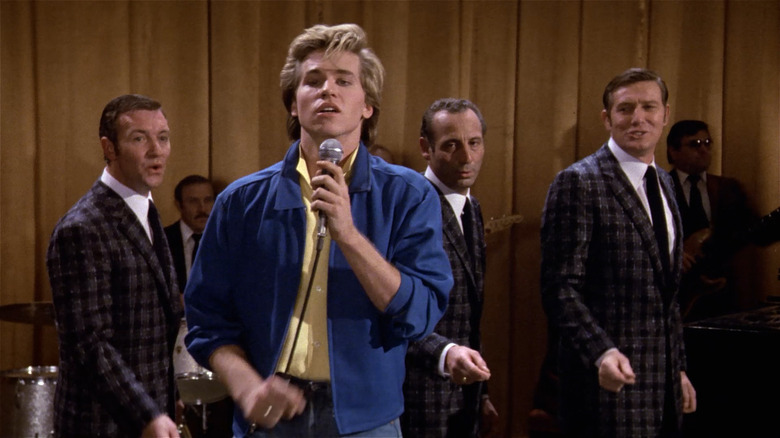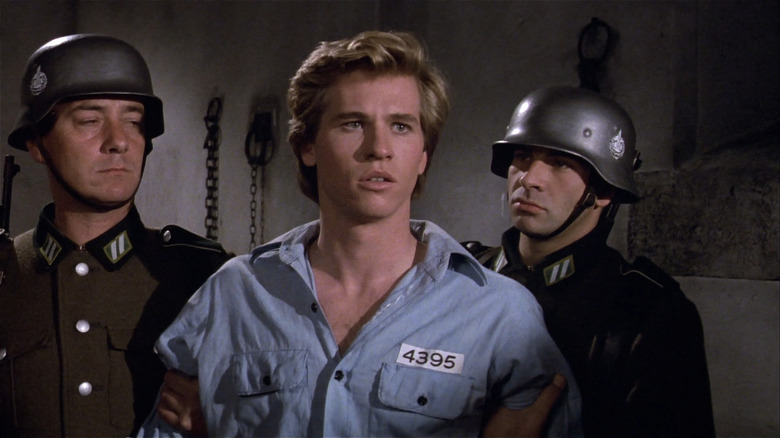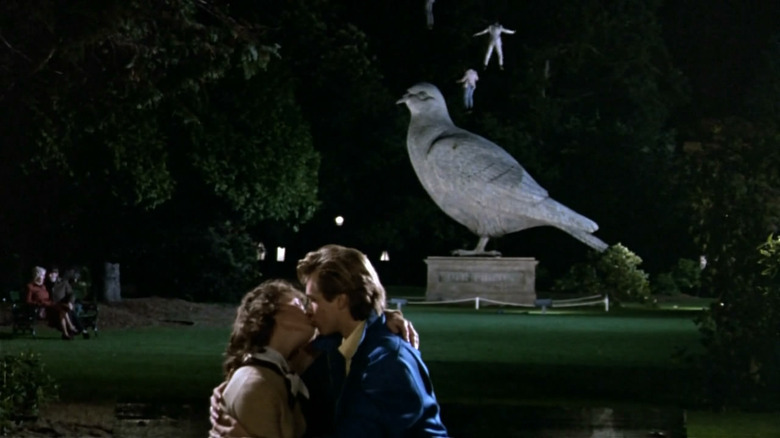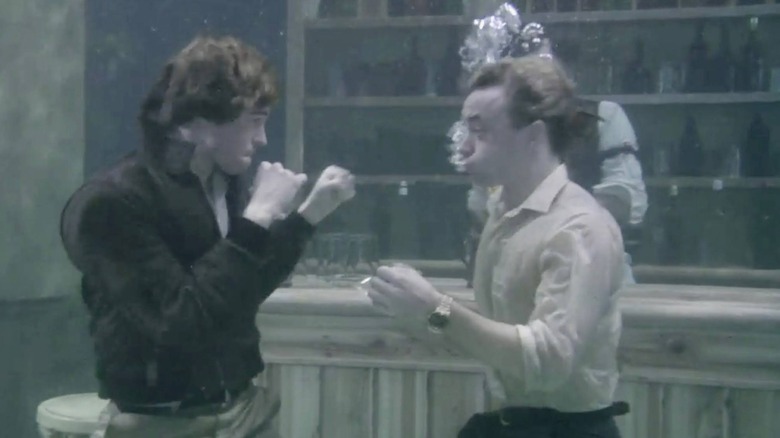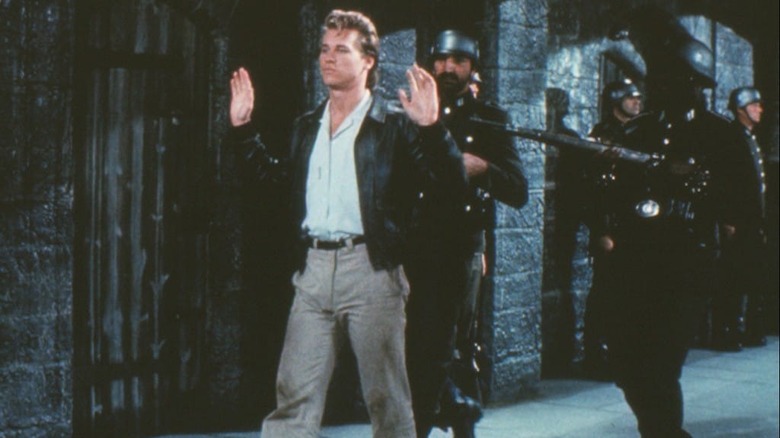Top Secret!: Val Kilmer's Gem Of A Parody Movie Deserves Your Attention
In 1980, the "Kentucky Fried Theater" writing/directing team of Jim Abrahams and brothers David and Jerry Zucker broke through with what some consider the greatest comedy of all time: "Airplane!"
The straight-faced spoof of disaster films like "Airport 1975" and "Zero Hour!" came out of nowhere, raking in $170 million on its way to surely becoming an instant classic. By the end of the decade, the team pulled a beloved comedic franchise out of the rubbish bin, rescuing their hastily-canceled TV series "Police Squad!" and resurrecting it as "The Naked Gun." Sandwiched in between these two ZAZ comedy classics is a forgotten one, however, a film ahead of its time that struggles to escape their shadow — even if holds its own among them, pound for pound and laugh for laugh.
It was 1984 and "Top Secret!" was the trio's desired follow-up to "Airplane!", developed at a time when Hollywood was begging them to make a sequel (and would, with 1982's "Airplane II: The Sequel"), but they had grander ambitions. A spoof of Elvis Presley vehicles, cold war suspense and classic WWII mission movies, it performed poorly at the box office, leading many to cite it as a sophomore slump — even if it was, technically, their third movie.
"Top Secret!" made just $20 million at the box office; while it has since developed a cult following, it certainly isn't as quoted or GIF'd as "Airplane!" or "Naked Gun." But its relative obscurity buries a ZAZ masterpiece every bit as hilarious as their best efforts. Weird Al, Phil Lord and Chris Miller and other comedy vets are among those who cite it as an inspiration; here's why the film is — how do you say? — indispensable.
The plot, as if it matters
In his exuberant review of "Top Secret!," Roger Ebert said that "to describe the plot would be an exercise in futility," but it's worth a try anyway.
The flick opens with teen heartthrob Nick Rivers (Val Kilmer, in his film debut) performing his latest hit song, a Beach Boys pastiche about guns called "Skeet Surfin'." He soon books a gig in what was then East Germany, though it looks exactly like cinematic portrayals of Occupied Germany. This is the first of many purposeful anachronisms that run throughout "Top Secret!," a movie that takes place in every decade from the '40s to the '80s, all at once.
While in East Germany, Nick uncovers a sinister plot by the East German government to take over West Germany, then subsequently becomes involved with a group of French Resistance fighters, even though the movie does not take place in France. Nick falls in love with one of the Resistance fighters, Hillary Flammond (Lucy Gutteridge), creating a love triangle between them and Hillary's former lover, the leader of the Resistance who fell in love with Hillary when they were both stranded on a deserted island. They'll need to work through their personal drama while trying to save the day, uncovering a traitor in the Resistance and saving Hillary's scientist father from German capture. Nick reveals himself to be just as capable an action hero as a singer, though he still uses some well-timed musical numbers to extract himself from tense situations.
The painful production
"Airplane!" may have been a sensation, but "Top Secret!" followed a moment of failure for Abrahams and the Zuckers. After "Airplane!" they created the TV series "Police Squad!," a parody of '50s and '60s police procedurals that later spawned the "Naked Gun" franchise. "Police Squad!" was acclaimed but cancelled after six episodes, and around that time the trio was asked to make an "Airplane!" sequel. But they let another director make what became "Airplane II: The Sequel" and instead set out to make something new, despite a lack of good ideas between them.
According to a 2014 oral history of the making of "Top Secret!"', they struggled to settle on a single genre to parody like they had with disaster movies, submitting one pitch bad enough to make then-Paramount head Michael Eisner think they "were putting him on." They eventually decided to give up trying to focus on one genre and make something less specific, more a "joke book" than a streamlined narrative.
Building a movie solely around jokes may sound easy, but writing without the safety net of a traditional structure makes it significantly more difficult to create a finished product that will coalesce in an entertaining way. Writing "Top Secret!" was an arduous process, then, requiring the addition of fourth writer Martyn Burke to do what David Zucker called "fit the plot around the scenes" they had come up with. Jerry Zucker told the New York Times that "[i]f it weren't for Martyn, we'd still be sitting in that room" writing.
The nonexistent narrative
In the decades after the failure of "Top Secret!", ZAZ would frequently apologize for the movie and reflect on why it hadn't caught on with audiences while "Airplane!" was a smash. They concluded that "Top Secret!" was a mishmash more than a coherent story, while the simpler story of "Airplane!" and its more obvious parody target made it easier for audiences to connect.
"One reason it flopped at the box office," The LA Times speculated in 1991, "may be that the vapid 'Airplane II: The Sequel' in 1982 turned fans away from anything else associated with the 'Airplane!' name, even though Zucker and Abrahams had nothing to do with the sequel."
"It [has always been] like a poor stepchild. Like, 'Oh, 'Top Secret!,' the bomb," said Jerry Zucker in 2014. "I'm very proud of the film. There's great, great stuff in there and I think it deserves the cult status ... as I look back at it, I'm beginning to look at our humor from the outside instead of just the inside. And I really like it. It's a stupid thing to say that I like it, but there's something about the mix of the three of us that is just unique and different and we just call it "ZAZ" for lack of a word, but that ZAZ thing is very in evidence in 'Top Secret!'"
The cow in boots
While the success of "Airplane!" may be partly owed to its simple, laughs-promising poster (an airplane twisted into a pretzel shape), the marketing for "Top Secret!" took another path, building all its posters and subsequent home-video releases around a visual gag from the movie: The image of a cow wearing boots.
While the sequence with the cow is one of the movie's many memorable moments (two of the Resistance fighters attempt to cross enemy lines by fitting into a cow costume), the joke is lost in the image, nearly impossible to communicate in the space of a poster, and as a marketing symbol, a non-sequitur promising goofiness without any semblance of the plot. It could just as easily be promoting a movie about talking animals as it could a war movie spoof. As it turns out, the image was reflective of an unmoored behind-the-scenes attempt to market the film.
"You know you're in trouble when you have trouble cutting a trailer," Jerry Zucker would later reflect.
Making a war picture
1970's "Airport" was the highest-grossing film of its year, a best picture nominee adapted from a bestselling book and starring the likes of Dean Martin, Burt Lancaster, and Oscar-nominated Maureen Stapleton and winner Helen Hayes. Needless to say, it was a cultural phenomenon and images like a hysterical old lady being slapped and a planeful of passengers preparing for a crash landing were emblazoned in the minds of millions. While rapidly-diminishing-in-quality sequels would eventually kill the self-serious franchise, "Airplane!" arrived at an ideal moment (one year after the poorly-reviewed "The Concorde" aka "Airport '79") when audiences could recite the "Airport" story beats by heart, and were ready to laugh at them.
"Top Secret!" took a riskier track, tackling genres that had long gone out of fashion; the final Elvis film had come out in 1969, and WWII films had been largely supplanted in Hollywood by Vietnam films like "Coming Home," "Apocalypse Now" (which Jim Abrahams would later spoof with "Hot Shots! Part Deux") and "First Blood."
But "Top Secret!" was made by people who knew the visual language of their parody's subject inside and out. They'd even hired the ideal crew members for their parody, with cinematographer Christopher Challis having worked on several classic British World War II movies and composer Maurice Jarre known for his music in David Lean war epics.
With this team, the initial set-up of war movie cliches like the heroes inadvertently crawling right up to an enemy soldier's boots was effective because it rang true; it was the ideal set up for a punchline. That made the comedic reversal of the cliche — the hero avoids detection because there's nobody actually in the boots — even funnier.
That's "Top Secret!" in a nutshell, a loving recreation of the conventions of a war movie, milking those conventions for every possible laugh.
An Elvis movie, but better
In addition to the loving parody of classic war movies, "Top Secret!" also affectionately satirized a much less respectable genre, the cheap teen musicals of the '60s — specifically those starring Elvis. While The King remains one of the most iconic figures in American pop culture (and a subject of movies), not much of that reputation is because of his movies.
A few Elvis vehicles (like "King Creole") are better than others, but he made an astounding 31 narrative films in 13 years, almost all of them requiring two things: he sings, and he gets the girl. With manager Tom "The Colonel" Parker typically serving as a "technical advisor," these films settled into a rut of indifferently-made duds with cookie-cutter romances, high-concept plots and soundtrack sales that would act as insurance against the box office take.
While Elvis (who died in 1977) was still certainly well-known by 1984, his movies had already begun to deservedly fade into obscurity. The risk of putting such a disrespected, forgotten genre in the same space as "serious" war movies was that it risked denigrating the quality of both. But Abrahams and the Zuckers approached "Top Secret!" by offering the same treatment to the worst Elvis vehicles as they did for something like "The Great Escape," poking fun at their sillier qualities while still having a blast making a movie in their style. Even the purposely shoehorned-in musical numbers are a joy, offering more musical entertainment than the oft-disposable Elvis movie songs.
Val Kilmer, king of comedy
Decades before "Kiss Kiss Bang Bang" or "MacGruber," Val Kilmer showed in his movie debut that he was much more than a leading man with a great chin. Here was a handsome star with a sense of humor.
In order for "Top Secret!" to accurately and effectively parody the Elvis movies, it would need an actor who could be credible as an Elvis-level matinee idol — but with the comedic chops to crack up the audience while keeping a Leslie Nielsen-like straight face. That actor was a then-unknown Kilmer, whose recent "Val" captures in brutal, endearing detail where he was at that point in his life: A trained stage actor, being courted by Hollywood (he had turned down "The Outsiders"), picking an anything-but-traditional debut project.
In the decades that followed, Kilmer would work predominantly in drama ("The Doors," "Heat") and crowdpleasers ("Top Gun, "Tombstone") and even kinda-sorta played Elvis again ("True Romance"). "Top Secret!" was a great showcase for the versatility that would mark much of his career; he did slapstick and action scenes (often at the same time), singing and dancing, leading man material and played tic-tac-toe during a shootout without cracking up.
Abrahams and the Zuckers would later worry that they gave Kilmer a character he couldn't do much with, someone vacuous to the point of rejecting the audience's sympathy. But Kilmer already had a movie star's talent for making even the least sympathetic character palatable; his efforts are even more impressive because, rather than the ensemble cast of "Airplane!", "Top Secret!" relies almost solely on his performance.
How silly can you get?
While the $9 million budget of "Top Secret!" wasn't a blockbuster sum, even for the '80s, it was a significant increase in budget for Abrahams and the Zuckers, who had made "Airplane!" for just over $2 million. That film had fit an incredible amount of visual gags into its single airplane set; now, the team was making a movie on a larger canvas with many more locations to play with, and they answered the challenge by putting the extra money into the silliest, most elaborate gags they could devise.
In the background of one scene, for example, there is a statue of a giant pigeon. Two men in white then fly onto the statue, and poop on it. While the premise of the joke is ingeniously simple (and quite in line with the infamous fan joke from "Airplane!"), its execution requires tremendous on-set effort for what amounts to a throwaway gag; that execution is what makes it transcendent.
There are jokes like that throughout "Top Secret!," where silliness rises to the quality of sublime because of the craft working behind it. It's no secret that so-called "spoof movies" would eventually become the bottom-scraping scourge of Hollywood (including some from these very same directors), but years before the genre descended into lazy rehashes of their targets with hardly any visual or written creativity of their own, films like "Airplane!" and "Top Secret!" not only invented a genre, but elevated stupidity to an art form.
The bookstore and the bar fight
The two high points of "Top Secret!" are also its most ridiculous, overly complicated sequences.
The first, in its bare function to the plot, is a standard exposition scene where a bookstore owner (played by Peter Cushing) reveals some new information to Nick and Hillary. But the bookstore is a Swedish one, and the illusion of the characters speaking Swedish is created by the scene playing backwards with subtitles. The complexity of the timing and jokes that ZAZ stage backwards, including prosthetic eye makeup on Cushing for a gag at the start of the scene and the additionally hard-to-control element of working with animals, is remarkable. The result is as impressive to watch as it uproarious.
The other sequence is the film's action climax, so it makes sense that the movie would put a lot of attention and money behind it. But what doesn't make sense is how they ended up with the idea: An old-fashioned barroom brawl between Nick and the traitorous Resistance fighter, filmed entirely underwater. If "Top Secret!" was governed by any logic until this point, the scene tosses it aside for good, embracing a cartoon aesthetic unburdened by any laws of nature or common sense. It shatters all conventions of reality — there's a chandelier? — and is rewarded for it with big laughs.
What happened after Top Secret!
Following the failure of "Top Secret!" at the box office, Abrahams and the Zuckers decided to branch out from parodies, making the straightforward comedy "Ruthless People" in 1986. It was a financial hit, making just over $70 million and leading to the even bigger success of "The Naked Gun." But "Naked Gun" would be the final movie to be made by Abrahams and the Zuckers together.
David Zucker took over directing and writing duties for the "Naked Gun" sequels, while Abrahams and Jerry Zucker embarked on solo careers. Abrahams created another hit parody franchise with "Hot Shots!" and its sequel, while Jerry had surprising dramatic success with "Ghost." Abrahams and Jerry Zucker mostly stopped working in the 2000s, but David kept working, either writing or directing the last three entries in the "Scary Movie" franchise.
The filmmakers now look back on "Top Secret!" with a mixture of regret and pride, getting hung up on little fixes that could have made it more successful, but growing to appreciate its strengths and the cult audience that it found.
"We could re-cut 'Top Secret!' and get rid of a few scenes and just add a little bit of a character to Val so it would have an ending and we could make the movie work today," Abrahams insisted in 2014.
"We didn't really have a big ending," added Jerry Zucker. "It ends it more abruptly than it should."
"We need to add a joke at the end," said David Zucker. "I'm planning to maybe do it and I want to go to Paramount and ask them to let us do it."
All three men made these comments during a 2014 screening of "Top Secret!" at San Francisco Sketchfest for its 30th anniversary, where it received the rapturous response it was denied upon release. "We fell back in love with a movie we had partially abandoned," said Jerry Zucker, realizing the joy that "Top Secret!" had brought to its small but devoted audience.
